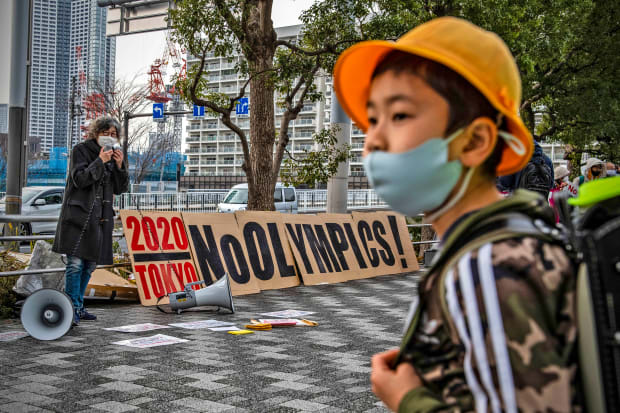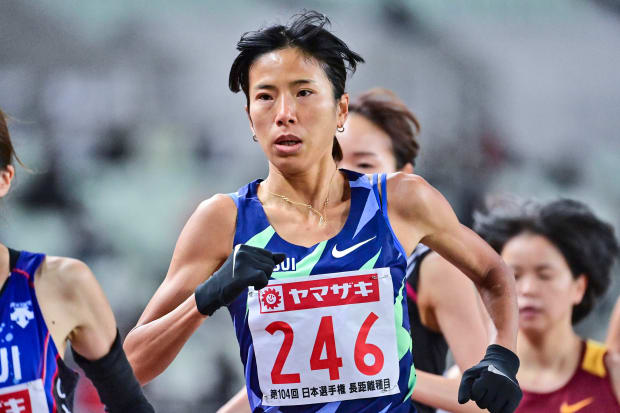The polls say people don’t want the Games, but the protests are lonely.
In late March, Yuko Arimori, a two-time Olympic medalist, found herself in a tense exchange on live TV with an official from the Tokyo Games’ organizing committee. It was a Sunday evening, less than a week before the start of the Summer Olympics torch relay in Japan, and Arimori had been invited, along with seven others, to public broadcaster NHK’s downtown Tokyo studios to discuss whether the country should host the world’s biggest sporting event in the midst of a pandemic.
The day before, the organizing committee had announced that spectators from overseas would not be allowed to attend the Games. It was a concession to those who opposed the event’s continuation, but one that also signaled the organizers’ determination to salvage what they could of the first Games to be postponed in the modern Olympics’ 125-year history.
Arimori, a former marathoner who won silver in Barcelona in 1992 and bronze in Atlanta in ’96 for Japan, took aim at the committee for not being more transparent. “The organizers have had the past year to communicate with the public. And yet public opinion hasn’t changed,” Arimori said. “They’ve kept sports officials in the loop. But they need to do more to win everyone’s understanding.”

Her criticism suggested that organizers had been putting their desire for the Summer Games above public safety. Residents of Japan had pulled together to keep the country’s COVID-19 death count below 10,000; bringing the world to Tokyo might jeopardize that. When the organizing official, Hidemasa Nakamura, explained that more COVID-19 guidelines for testing athletes and securing hospital beds were in the works, Arimori shot back: “Stop thinking about the athletes and sports. Think about the people supporting them. Society has to come first!”
The moment seemed to crystallize a year of frustration for the Japanese public. As daily coronavirus cases in Japan spiked above 7,800 early this year—a fraction of the U.S. peak but a high for the country—and new, more contagious variants from overseas emerged, opposition to the Games rose. One poll in January showed that more than 80% of Japanese respondents favored canceling or postponing them. The country’s slow vaccination rollout, which started only in late February, will likely mean that many residents won’t be inoculated by the opening ceremony, scheduled for July 23.
Meanwhile, the organizing committee has been beset by scandal, with its head, Yoshiro Mori, being forced to resign in February after having made sexist comments. Arimori seemed to be channeling what so many others in the country felt: enough.
Toshio Miyazaki, the 60-year-old founder of a group called 2020 No Thank You to Olympic Disasters, has been counting on that feeling to spread. He’s spent the past four years trying to whip up support to have the Tokyo Games scrapped. But at a recent rally in March, outside the Olympics organizers’ headquarters, the group could muster only about 80 supporters, a mostly middle-aged crowd that was outnumbered by police officers. After an hour of speeches and polite applause, the protesters marched on the street through the teeming youth fashion district nearby, their chants occasionally drowned out by passing cars. As the ragtag procession snaked by with handmade signs and banners, one young woman in a long coat watching from the sidewalk turned to a friend. “Why don’t they just do that on social media?” she said.
Afterward, Miyazaki, a Tokyo middle school administrator, said, “Most of the public disapproves of what we’re doing.”

So, how to explain the current mood in Japan? If there’s so much opposition, why have so few people voiced it? One reason: There’s no mainstream tradition of protesting in the country, says Yuji Ishizaka, an Olympics historian and sociology professor at Nara Women’s University. Most people see a big difference between wanting the Games canceled because of the virus and joining anti-Olympics rallies, he says. In Japan there’s great reverence for the Games. They aren’t thought of only as a mega sporting event; they’re a potent symbol of peace. Not many people would willingly join in to call for the death of something that important, Ishizaka says.
Meanwhile, Japanese athletes’ voices have been largely absent from the discussion—on both sides of the issue. Criticism brings its own risks, and without broad, public support for the Tokyo Games, nobody wants to be seen jabbering on about Olympic dreams while the country is struggling to contain a deadly pandemic, even if it is Japan’s first Summer Games in 57 years.
The reluctance to speak up is not surprising, says Dai Tamesue, a former sprinter who competed in three Olympics for Japan. “There’s a long tradition in Japan of athletes not talking about anything except their sport. The athletes are conditioned in self-restraint,” he says. “Generally speaking, it’s also very hard to express a view here that runs counter to the prevailing one.” Years ago, Tamesue—an author and founder of Athletes Society, which promotes sports in Southeast Asia—landed in hot water after endorsing a politician. “The culture is starting to change, thanks to Naomi Osaka and others. But athletes tend to become coaches here, so the culture gets reinforced,” he says.
When The Asahi Shimbun asked 41 anonymous athletes about their concerns in January, more than half said they feared a COVID-19 outbreak at the Games, while others expressed worry about getting sick themselves or felt discouraged by the lack of public excitement around the Olympics.
A few top athletes have attempted to weigh in and persuade the public to be more supportive of the Games. Last November, Kohei Uchimura, Japan’s most decorated gymnast, made a direct plea to the audience during the closing ceremonies of a four-nation friendly meet in Tokyo. “I don’t think the Olympics will go forward unless the Japanese public and athletes are on the same page. There has to be a way to make it happen. I don’t want people to think that it can’t be done,” he said. Gymnastics officials and newspaper columnists applauded his remarks, but on Twitter, he was derided as egotistical, impertinent and out of touch with reality.

As the Games grow closer, though, public opinion appears to be shifting. A February poll found that opposition had dropped to 60%; by late March, another concluded that about half of the public thought the Olympics should be canceled or postponed (while 9% felt they should proceed as normal and 36% said only if there were limits or a ban on spectators). It’s as if the public had witnessed its own powerlessness to make a difference and adopted a more pragmatic view. (It likely also mattered that by March case counts had dropped back below pre-spike levels, to fewer than 2,000 per day.)
The International Olympic Committee and Japanese organizers say that another delay is not an option. And in the coming months, they’ll have plenty of chances to prove themselves to the public. In February, the organizers put out “playbooks” with details of how they will keep tabs on the health and movements of more than 15,000 Olympic and Paralympic athletes from some 200 countries. But the organizers’ best hope of fully winning over the Japanese public may be the Olympic torch relay. Traditionally a sideshow, the 121-day relay started in late March and involves 10,000 runners criss-crossing the nation. It’s a crucial test of the Games’ blueprint for mask-wearing, social distancing, crowd limits and cheering bans (to avoid virus projection, only clapping is allowed). In a setback for Olympic organizers, this week’s torch-relay route through Osaka prefecture will not be run through its streets, but confined to a park, from which spectators will be banned. The last-minute change was requested by the prefecture after an uptick of coronavirus cases in Osaka city triggered a medical state of emergency.
The Games’ 80,000 volunteers also have yet to be trained or given their assignments. As of late March, millions of ticket holders inside Japan still hadn’t heard whether organizers would allow spectators in stadiums. That created havoc in the tourism sector, where hotels, airlines and travel agencies have been left to guess about the future.

More than 500 cities, towns and villages have signed up to host early-arriving athletes. But so far the only guidance from the government and organizers has been to limit contact between the athletes and local residents, which would defeat the purpose of a costly cultural exchange, says Takanari Kuroda, an official in Gujo, in central Japan. The small city of 42,000 residents has invited the women’s rugby sevens teams from Colombia and Madagascar. “We need to receive more guidance about testing and other logistics to decide whether we can handle it,” says Kuroda.
Tokyo organizers now say that the Games will cost $15.4 billion—more than twice the initial estimates. Government audits suggest the number is closer to $25 billion, making these the most expensive Olympics on record by $10 billion. A scaled-down Tokyo Games with few or no spectators would leave Japan without much to show for its spending. One study by Kansai University professor emeritus Katsuhiro Miyamoto estimates that economic losses could reach $22 billion. (Japan’s Olympic sponsors seem to have lowered their expectations, too. Wary of attracting a backlash, they have quietly delayed or dialed back their advertising and marketing events for now.) The financial hit would be even greater, of course, if the Games don’t go off at all.
Meanwhile, people in Japan will continue to weigh the benefits and risks. Late last year, after Hitomi Niiya broke the Japanese women’s record for 10,000 meters at an Olympic qualifier, she summed up the dilemma. “As an athlete, I’m all for the Olympics. But as a citizen, I’m against it,” she said. “A person’s life is more important than the Olympics.”
Kenji Hall is an American journalist based in Tokyo
What Happened to 'Sports Jeopardy!'?
What Happens Now to the NFL Prospects Who Opted Out of Their Final College Season?
Asian American Runners Fight to Reclaim a Refuge
Baseball Needs to Rally in 2021. The Future of the Game Is at Stake